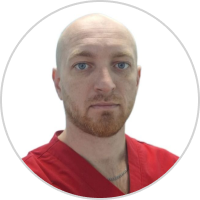
Genetic testing for thyroid cancer (TC)
Thyroid cancer is relatively rare compared to other cancers.
Thyroid cancer is usually diagnosed at a younger age than most other cancers, with women’s morbidity about 3 times higher.
TC types
Depending on the cells present in the tumor, TC is divided into types, what is important for treatment and prognosis. Types of thyroid cancer:
Differentiated thyroid cancer
- papillary thyroid cancer (the most common, occurs more often in 30 — 50 years, highly curable)
- follicular thyroid cancer (rare, occurs more often after 50 years, is more often localized if it spreads — to the lungs and bones)
- TC from Hurthle cells (rare, aggressive and able to grow, involving neck structures and spreading to other parts of the body
- low-grade TC (rare, more aggressive than other differentiated types of TC, and often does not respond to standard therapy)
Anaplastic TC
Anaplastic TC (rare, fast-growing, occurs more often after 60 and is difficult to treat.
Medullary TC
Medullary TC (rare, arises from C-cells that produce the hormone called calcitonin. Elevated calcitonin level in the blood may indicate medullary thyroid cancer at a very early stage. Some types of medullary thyroid cancer are caused by the RET gene, which is passed from parents to children. Changes in the RET gene can cause hereditary medullary TC and multiple endocrine neoplasia type 2.
Other rare types:
- Thyroid lymphoma
- Thyroid sarcoma
Approximately 85% of patients with familial forms of TC (manifested as part of multiple endocrine neoplasia type 2 syndromes (MEN 2) or as a familial form of medullary TC) have a mutation of the RET gene in 634 codon. Mutations of the RET gene in codons 618 and 620 are even less than 10%. Early and aggressive medullary TC is associated with mutations of the RET gene in codons 634 and 918 and requires as early intervention as possible.
883 codon mutation of the RET is associated with a much more indolent (slow-growing and rarely spreading to the lymph nodes type of medullary TC).
All these mutations are included in the assay!
What is genetic testing for thyroid cancer?
An NGS-based assay includes a panel of genes concurred with the clinical use of approved targeted drugs and drugs from prospective clinical trials for thyroid cancer.
Alterations in these genes lead to tumor development and are used as diagnostic, prognostic, and predictive cancer markers.
"First Genetics Lab" performs testing using the high‑throughput sequencing system named "F‑Genetics" and reagents for high‑throughput next generation sequencing (NGS) of genes associated with human cancer genesis, that are registered as medical devices (Federal Service for Surveillance in Healthcare: РЗН 2020/10521, РЗН 2022/16970)
The assay detects:
- Hotspots (SNV/InDels)
- Copy number variations (CNV)
- Chromosomal aberrations (Gene fusions)
Indications for testing
For patients diagnosed with thyroid cancer for:
- Therapy selection
- Therapy monitoring and correction if the cancer recurrence occurs
- Clinical trials enrollment
- Hereditary medullary thyroid cancer or MEN 2 suspicion
KINASE INHIBITORS (TKI) THERAPY PRINCIPLES IN ADVANCED THYROID CANCER
(NCCN Guidelines Version 2.2022)
Oral kinase inhibitors demonstrate clinically significant activity in randomized placebo‑controlled clinical trials in locally recurrent inoperable and metastatic medullary thyroid cancer (mTC) and differentiated thyroid cancer (dTC) refractory to radiotherapy.
When considering TKI therapy for individual patients, several factors should be taken into account:
- Therapy with TKI may be associated with improved progression-free survival, but is not curative.
- TKI therapy is expected to cause side effects that can have a significant impact on quality of life.
- The pathogenesis of mTC and dTC is quite variable, and the rate of progression of the disease varies from several months to many years.
When deciding on treatment, the rate of progression of the disease should be taken into account. Patients with a very sluggish disease that is asymptomatic may not be suitable for kinase inhibitor therapy, especially if the side effects of treatment negatively affect the patient’s quality of life, while patients with a more rapidly progressing disease may benefit from TKI therapy, even if they have side effects.
Molecular diagnostic testing to identify individual mutations (e.g. BRAF V600E, RET/PTC, RAS, PAX8/PPAR) or methods of molecular classifiers may be useful for therapeutic decision-making of uncertain samples.
The BRAF V600E mutation occurs in approximately 45% of patients with papillary carcinoma and is the most common mutation. Some studies have linked the BRAF V600E mutation with a poor prognosis, especially in the presence of a TERT promoter mutation.
NCCN recommends
considering the possibility of conducting molecular diagnostic testing for undetermined groups of thyroid cancer identified during cytological examination and evaluated by the Bethesda system:
- follicular or neoplasms of Hurthle cells (Bethesda IV);
- AUS/FLUS (undetermined value/follicular lesion of undetermined value), (Bethesda III).
RECURRENT, WIDESPREAD OR METASTATIC papillary/follicular/ from Hurthle cells thyroid cancer, NOT AMENABLE TO THERAPY WITH RADIOACTIVE IODINE
In a widespread, progressive disease, genomic testing uses to identify acceptable mutations (including ALK, NTRK and RET gene rearrangements), mismatch repair system deficiency (dMMR), microsatellite instability (MSI), tumor mutational burden (TMB)
Preferred therapy regimens
Lenvatinib
Other recommended treatment regimens
Sorafenib
Under certain circumstances:
Cabozantinib — with progression after taking lenvatinib and/or sorafenib
Larotrectinib or entrectinib -for patients with progressive solid tumors with positive fusion of NTRK genes
Selperkatinib or pralsetinib — for patients with tumors positive for RET-rearrangements
Pembrolizumab — for patients with high mutational load (TMB-H) (≥10 [mut/Mb])
Clinical trials
Other treatments may be considered for progressive and/or symptomatic disease if clinical trials or other systemic treatments are not available or are not suitable (axitinib, everolimus, pazopanib, sunitinib, vandetanib, vemurafenib [BRAF+] or dabrafenib [BRAF+])
RECURRENT OR PERSISTENT MEDULLARY thyroid cancer
Systemic therapy:
Preferred therapy regimens
Vandetanib
Cabozantinib
Selperkatinib (RET mutation)
Pralsetinib (RET mutation)
Under certain circumstances:
ПPembrolizumab (TMB ≥10 mut/Mb)
When PROGRESSed
the same modes + therapy with small molecules — kinase inhibitors (for example, sorafenib, sunitinib, lenvatinib or pazopanib, if there are no options for clinical trials)
METASTATIC ANAPLASTIC THYROID CANCER
Molecular testing for the presence of clinically significant mutations of BRAF, NTRK, ALK, RET, MSI, dMMR, TMB-H
Preferred therapy regimens
Dabrafenib/trametinib (BRAF V600E mutation)
Larotrectinib (fusion involving NTRK genes)
Entrectinib (fusion involving NTRK genes)
Pralsetinib (fusion involving RET )
Selpercatinib (fusion involving RET )
Under certain circumstances
Paclitaxel
Doxorubicin
Paclitaxel/carboplatin
Docetaxel/doxorubicin
Other recommended treatment regimens
Doxorubicin/cisplatin
Pembrolizumab — for patients with high mutational load (TMB-H) ((≥10 [mut/Mb])
NGS method
NGS can simultaneously read hundreds of millions of short sequences of DNA and detect all types of mutations, including

Hotspots (SNV/InDels)

Copy number variations (CNV)

Chromosomal aberrations (Gene fusions)
Advantages
- High sensitivity and specificity of the method
- Fast turnaround time
- Simultaneous detection of all types of mutations, including chromosomal aberrations
- Minimum requirements for sample quantity and quality
- Shorter testing times
How to request genetic testing for thyroid cancer?
Download and fill out the informed consent form
A courier will collect histological material and take it to the laboratory free of charge.
First Genetics Laboratory
Specialists
Years of experience in genetics, laboratory diagnostics and bioinformatics
Confidentiality
All data is strictly confidential and cannot be passed on to third parties
Time frame
Results ready in a short time
Security
Extensive control at each stage of testing
No delivery fees
Free delivery of biomaterial across Russia
Charities
Email info@f-genetics.com for information


